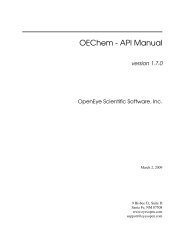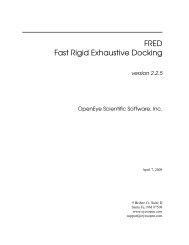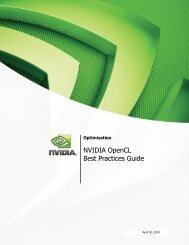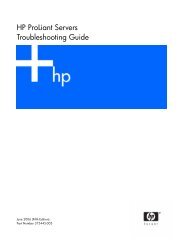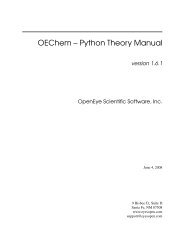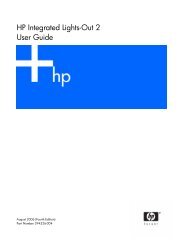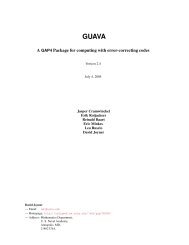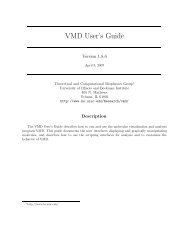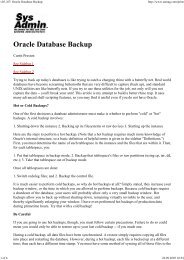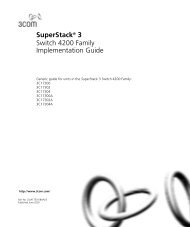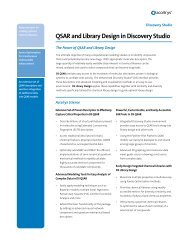Reports1.9.3 Table reportsTable reports list information about tables owned by the user associated with thespecified connection. This information is not specifically designed to identify problemareas; however, depending on your resources and requirements, some of theinformation might indicate things that you should monitor or address.For table reports, the owner is the user associated with the database connection.Columns: For each table, lists each column, its data type, and whether it can contain anull value.Datatype Occurrences: For each table owner, lists each data type and how many timesit is used.Comments for tables and columns: For each table and for each column in each table,lists the descriptive comments (if any) associated with it. Also includes a report oftables without comments. If database developers use the COMMENT statement whencreating or modifying tables, this report can provide useful information about thepurposes of tables and columnsConstraints: For each table, lists each associated constraint, including its type (uniqueconstraint, check constraint, primary key, foreign key) and status (enabled ordisabled).Enabled Constraints and Disabled Constraints: For each constraint with a status ofenabled or disabled, lists the table name, constraint name, constraint type (uniqueconstraint, check constraint, primary key, foreign key), and status. A disabledconstraint is not enforced when rows are added or modified; to have a disabledconstraint enforced, you must edit the table and set the status of the constraint toEnabled (see the appropriate tabs for Create/Edit Table (with advanced options)).Primary Key Constraints: For primary key constraint, lists information that includesthe owner, the table name, the constraint name, the constraint status (enabled ordisabled), and the column name.Unique Constraints: For each unique constraint, lists information that includes theowner, the table name, the constraint name, the constraint status (enabled or disabled),and the column name.Foreign Key Constraints: For each foreign key constraint, lists information thatincludes the owner, the table name, the constraint name, the column that the constraintis against, the table that the constraint references, and the constraint in the table that isreferenced.Check Constraints: For each check constraint, lists information that includes theowner, the table name, the constraint name, the constraint status (enabled or disabled),and the constraint specification.Statistics: For each table, lists statistical information, including when it was lastanalyzed, the total number of rows, the average row length, and the table type. Inaddition, specialized reports order the results by most rows and largest average rowlength.Storage - Tables by Tablespace: For each tablespace, lists the number of tables and thetotal number of megabytes currently allocated for the tables.Storage - Tablespaces: For each table, lists the tablespace for the table and the numberof megabytes currently allocated for the table.Organization: Specialized reports list information about partitioned tables, clusteredtables, and index-organized tables.1-24 <strong>SQL</strong> <strong>Developer</strong> Online Help
ReportsQuality Assurance reportsQuality assurance reports are table reports that identify conditions that are nottechnically errors, but that usually indicate flaws in the database design. These flawscan result in various problems, such as logic errors and the need for additionalapplication coding to work around the errors, as well as poor performance withqueries at run time.Tables without Primary Keys: Lists tables that do not have a primary key defined. Aprimary key is a column (or set of columns) that uniquely identifies each row in thetable. Although tables are not required to have a primary key, it is stronglyrecommended that you create or designate a primary key for each table. Primary keycolumns are indexed, which enhances performance with queries, and they arerequired to be unique and not null, providing some "automatic" validation of inputdata. Primary keys can also be used with foreign keys to provide referential integrity.Tables without Indexes: Lists tables that do not have any indexes. If a column in atable has an index defined on it, queries that use the column are usually much fasterand more efficient than if there is no index on the column, especially if there are manyrows in the table and many different data values in the column.Tables with Unindexed Foreign Keys: Lists any foreign keys that do not have anassociated index. A foreign key is a column (or set of columns) that references aprimary key: that is, each value in the foreign key must match a value in its associatedprimary key. Foreign key columns are often joined in queries, and an index usuallyimproves performance significantly for queries that use a column. If an unindexedforeign key is used in queries, you may be able to improve run-time performance bycreating an index on that foreign key.Related TopicsReports1.9.4 PL/<strong>SQL</strong> reportsPL/<strong>SQL</strong> reports list information about PL/<strong>SQL</strong> packages, function, and procedures,and about types defined in them.Program Unit Arguments: For each argument (parameter) in a program unit, lists theprogram unit name, the argument position (1, 2, 3, and so on), the argument name,and whether the argument is input-only (In), output-only (Out), or both input andoutput (In/Out).Unit Line Counts: For each PL/<strong>SQL</strong> object, lists the number of source code lines. Thisinformation can help you to identify complex objects (for example, to identify codethat may need to be simplified or divided into several objects).Search Source Code: For each PL/<strong>SQL</strong> object, lists the source code for each line, andallows the source to be searched for occurrences of the specified variable.Related TopicsReports1.9.5 Security reportsSecurity reports list information about users that have been granted privileges, and insome cases about the users that granted the privileges. This information can help you(or the database administrator if you are not a DBA) to understand possible security<strong>SQL</strong> <strong>Developer</strong> Concepts and Usage 1-25
- Page 1 and 2: Oracle SQL DeveloperOnline HelpRele
- Page 3 and 4: Contents1 SQL Developer Concepts an
- Page 5 and 6: 3.12 Create/Edit Index ............
- Page 7 and 8: 6.3.2 Updating Data With the UPDATE
- Page 9: 10.2.5 SQL*Plus SET Commands.......
- Page 12 and 13: SQL Developer User InterfaceThe men
- Page 14 and 15: SQL Developer User InterfaceThe Com
- Page 16 and 17: Database Objects1.2 Database Object
- Page 18 and 19: Database Objectscontaining the mast
- Page 20 and 21: Database Objects■■■■■■
- Page 22 and 23: Database ConnectionsWhen you start
- Page 24 and 25: Running and Debugging Functions and
- Page 26 and 27: Using the SQL WorksheetRelated Topi
- Page 28 and 29: Using the SQL WorksheetScript Runne
- Page 30 and 31: Using the SQL Worksheetmentioned in
- Page 32 and 33: Reports1.9 ReportsRelated TopicsRun
- Page 36 and 37: Reportsissues and vulnerabilities,
- Page 38 and 39: SQL Developer Preferencesand the SQ
- Page 40 and 41: SQL Developer Preferences1.10.3 Cod
- Page 42 and 43: SQL Developer PreferencesSQL Develo
- Page 44 and 45: SQL Developer User Information: Loc
- Page 46 and 47: Supplementary Oracle Database Infor
- Page 48 and 49: Creating a Table (Books)the table t
- Page 50 and 51: Creating a Table (Transactions)Colu
- Page 52 and 53: Creating a SequenceName: for_key_bo
- Page 54 and 55: Creating a PL/SQL Procedure2.6 Crea
- Page 56 and 57: Using the SQL Worksheet for Queries
- Page 58 and 59: Script for Creating and Using the L
- Page 60 and 61: Script for Creating and Using the L
- Page 62 and 63: Check for UpdatesTo remove the effe
- Page 64 and 65: Select Library3.8 Select LibraryThi
- Page 66 and 67: Create PL/SQL Function, Procedure,
- Page 68 and 69: Create Table (quick creation)Relate
- Page 70 and 71: Create/Edit Table (with advanced op
- Page 72 and 73: Create/Edit Table (with advanced op
- Page 74 and 75: Create/Edit Table (with advanced op
- Page 76 and 77: Create/Edit Table (with advanced op
- Page 78 and 79: Create Type (User-Defined)For more
- Page 80 and 81: Create/Edit ViewTest Syntax: Checks
- Page 82 and 83: Configure File Type AssociationsDia
- Page 84 and 85:
Find/Replace TextTo add a type of o
- Page 86 and 87:
Save/Save As3.37 Save/Save As3.38 S
- Page 88 and 89:
SQL*Plus Location3-28 SQL Developer
- Page 90 and 91:
Managing TablesTo include lowercase
- Page 92 and 93:
Managing Tables4.2.4 Column Constra
- Page 94 and 95:
Managing Indexes4.3 Managing Indexe
- Page 96 and 97:
Managing Indexesuseful when all of
- Page 98 and 99:
Managing Views4.4 Managing Views4.3
- Page 100 and 101:
Managing Synonyms4-12 SQL Developer
- Page 102 and 103:
Storing Numeric Data■■NCHAR and
- Page 104 and 105:
Storing Numeric DataThe absence of
- Page 106 and 107:
Storing Datetime Data5.4.1.2 Using
- Page 108 and 109:
Storing Datetime Data5-8 SQL Develo
- Page 110 and 111:
Retrieving Data With Queries■■
- Page 112 and 113:
Retrieving Data With QueriesSee Als
- Page 114 and 115:
Retrieving Data With QueriesSee Als
- Page 116 and 117:
Transaction Control Statements6.3.2
- Page 118 and 119:
Using Pseudocolumns, Sequences, and
- Page 120 and 121:
Using Pseudocolumns, Sequences, and
- Page 122 and 123:
Using Pseudocolumns, Sequences, and
- Page 124 and 125:
Using SQL Data Definition Language
- Page 126 and 127:
Using SQL Data Definition Language
- Page 128 and 129:
Entering and Executing PL/SQL CodeY
- Page 130 and 131:
Utilizing the Main Features of PL/S
- Page 132 and 133:
Utilizing the Main Features of PL/S
- Page 134 and 135:
Utilizing the Main Features of PL/S
- Page 136 and 137:
Utilizing the Main Features of PL/S
- Page 138 and 139:
Utilizing the Main Features of PL/S
- Page 140 and 141:
Utilizing the Main Features of PL/S
- Page 142 and 143:
Utilizing the Main Features of PL/S
- Page 144 and 145:
Utilizing the Main Features of PL/S
- Page 146 and 147:
Utilizing the Main Features of PL/S
- Page 148 and 149:
Handling PL/SQL ErrorsTo handle une
- Page 150 and 151:
Handling PL/SQL ErrorsIf you redecl
- Page 152 and 153:
Handling PL/SQL Errors7-26 SQL Deve
- Page 154 and 155:
Overview of Packages and Subprogram
- Page 156 and 157:
Managing Packagescalling procedures
- Page 158 and 159:
Oracle Product-Specific PackagesTab
- Page 160 and 161:
Oracle Product-Specific PackagesTab
- Page 162 and 163:
Oracle Product-Specific Packages8-1
- Page 164 and 165:
Overview of Triggers9.1.1 Types of
- Page 166 and 167:
Overview of Triggers■■A trigger
- Page 168 and 169:
Designing TriggersNote: A procedure
- Page 170 and 171:
Using SQL*Plus■■■Running Scri
- Page 172 and 173:
Using SQL*PlusA SQL script file is
- Page 174 and 175:
Using SQL*Plus10-6 SQL Developer On
- Page 176 and 177:
Overview of Globalization Support
- Page 178 and 179:
Setting up the Globalization Suppor
- Page 180 and 181:
Setting up the Globalization Suppor
- Page 182 and 183:
Setting up the Globalization Suppor
- Page 184 and 185:
Setting up the Globalization Suppor
- Page 186 and 187:
Setting up the Globalization Suppor
- Page 188 and 189:
Setting up the Globalization Suppor
- Page 190 and 191:
Setting up the Globalization Suppor
- Page 192 and 193:
SQL and PL/SQL Programming with Uni
- Page 194 and 195:
SQL and PL/SQL Programming with Uni
- Page 196 and 197:
Locale-Dependent SQL Functions with
- Page 198 and 199:
Locale-Dependent SQL Functions with
- Page 200 and 201:
COLLECTION_IS_NULL exception, 7-22c
- Page 202 and 203:
overview, 7-14EXPLAIN PLANexecution
- Page 204 and 205:
NLSSORT SQL function, 11-21NO_DATA_
- Page 206 and 207:
displaying output from PL/SQL, 7-9s
- Page 208:
disabling, 9-4enabling, 9-4error co



